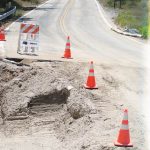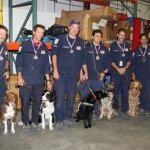We had really bad luck in scheduling our Fire Prevention Muster, which just happened to fall on the only day in months with cold and wet weather. The bad weather forecasts for Saturday, April 26, were pretty firm by Wednesday, April 23, but Executive Director Edwina Scott’s final check was with U.S. Forest Service Division Chief Dan Felix, who is highly respected for his weather-data interpreting skills.
Dan kindly left a class he was attending in Sacramento to get to a computer to go over the weather data, and by late Wednesday he was confirming the forecasts that called for snow and rain in Idyllwild.
Since the event relies on good weather, we agreed to postpone the muster. It was the right call since the weather really did turn out to be lousy that Saturday.
We are trying to figure out a good date to reschedule but it’s not easy. Weekends are busy in Idyllwild in the summer and fall, and we don’t want to conflict with other activities.
As the fire season progresses, fire agencies can’t guarantee their personnel will be available since they are going to go to fires if needed.
A day in October is now being discussed, but October happens to be the peak of fire season and agencies are very nervous about making other commitments during that time. This is going to take a while to sort out but we will let the community know as soon as a decision is made.
In the meantime, we are working on scheduling a town hall meeting to discuss two important, fire-related topics: how the Mountain Fire behaved in relation to treated areas last summer, and how fire experts view current needs for fuels projects on the Hill.
Regarding the first topic, the USFS has completed a report that evaluates the effectiveness of fuel treatments in reducing fire behavior in the Mountain Fire. The report has not been made public, but we hope to have USFS experts discuss the findings in a town hall meeting as soon as we can.
Since the Mountain Fire brought about the only town evacuation in many years, we are sure the community will be interested in what fire experts have to say about how fuel-reduction efforts influenced how it burned.
Building on this topic, we are in the process of updating the Community Wildfire Protection Plan, and probably the most important activity in the updating process is for fire experts to evaluate the fuels projects done as part of the plan, and to map out what they think needs to be done in the future.
We think a discussion of future fuels projects, and the analyses supporting them, would be very helpful, not to mention interesting, to the community.
We are currently trying to get dates that will allow key fire agency people to attend and speak with interested citizens on both topics. I am very eager to see this happen and hoping we can do it in June. We will publicize the meeting as soon as it is set.
I am sure most of us took notice of the Etiwanda Fire that started in the big winds on April 30 north of Rancho Cucamonga. It was a not-so-gentle announcement that the fire season is here and we need to be ready.










